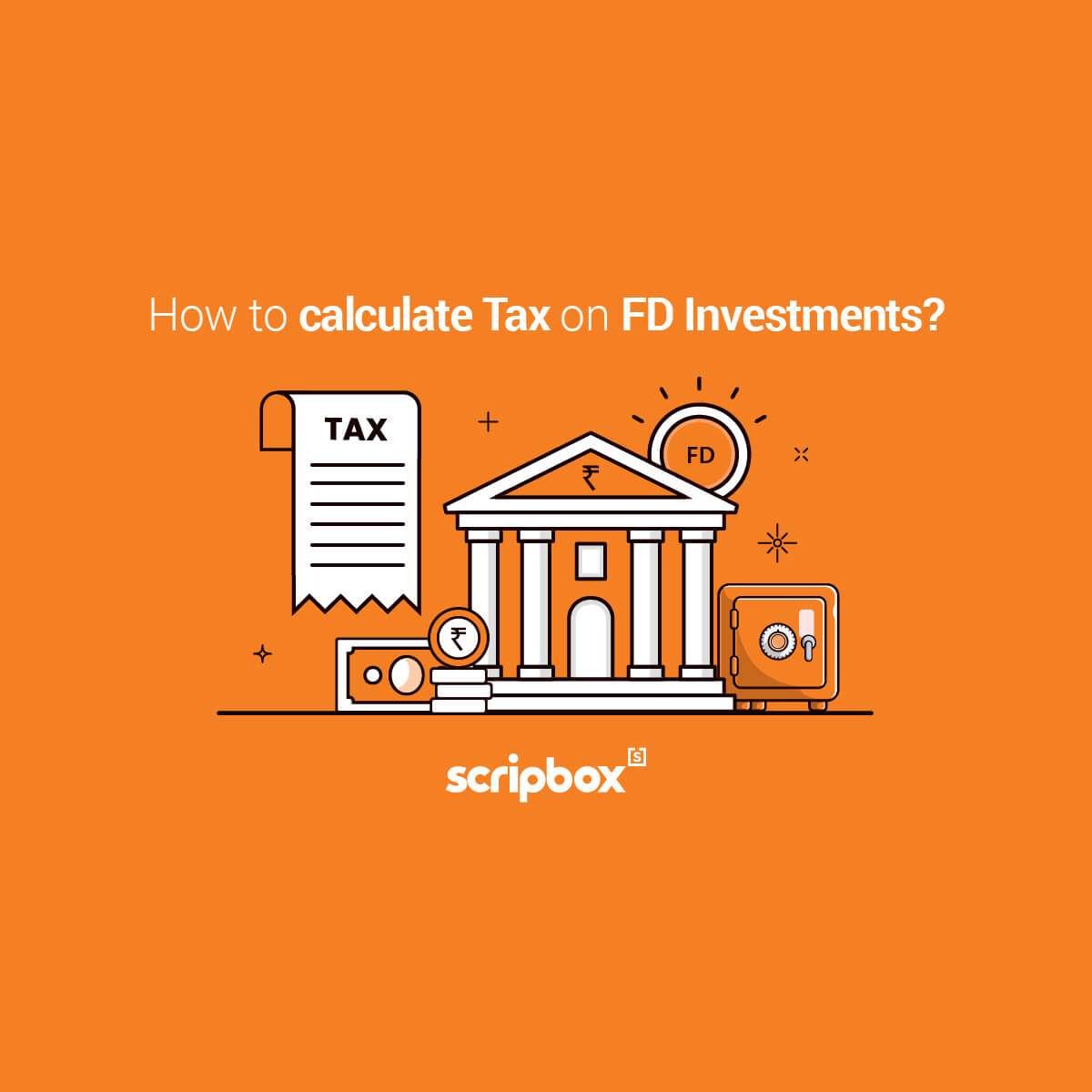Earning interest on a fixed deposit is very common for an individual taxpayer. This is mostly because the fixed deposit is the most common investment option for most individual taxpayers. With the interest income, you must have noticed a deduction of TDS and a lower interest income than expected. Moreover, you also have to pay tax on FD.
Tax on FD in India
Interest Income
The interest income received from a fixed deposit is taxable under the head of ‘Income From Other Sources’. Furthermore, FD interest is taxable at the applicable slab rate. Hence, if the total income of the taxpayer is more than Rs 10 lakhs then they fall under the 30% tax slab. Hence, the FD interest is taxable at 30%
Investment in FD
If a taxpayer invests in a tax-saving fixed deposit scheme then the total amount is eligible for a tax deduction. A tax deduction is allowed under section 80C up to Rs 1.5 lakh. You can invest in a tax saving FD with either a bank or post office.
How To Calculate Tax on FD Interest Income?
To calculate the tax on FD income you can follow the following steps:
- Add the total FD interest to your income under the head ‘Income From Other Sources’
- Add remaining income under each head of income.
- Deduct the tax allowances, deductions, and exemptions
- Calculate the tax on total income as per applicable slab
Illustration on How To Calculate Tax on FD
Miss Nilima earns the following income during the financial year 2021-2022.
| Particulars | Amount |
| Salary Income | Rs 8,00,000 |
| FD Interest | Rs 50,000 |
| Investment in Tax Saving FD | Rs 1,00,000 |
The following is the detailed explanation of the calculation of tax
| Particulars | Amount |
| Income Under the Head ‘Salaries’ | Rs 8,00,000 |
| Income Under the Head ‘Other Sources’ | Rs 50,000 |
| Total Income | Rs 8,50,000 |
| Less: Deductions | |
| Section 80C | (Rs 1,00,000) |
| Net Taxable Income | Rs 7,50,000 |
| Tax Payable | |
| Up To Rs 2,50,000 | Nil |
| Rs 2.5 – Rs 5 lakh Taxable at 5% | Rs 12,500(Rs 2,50,000 * 5%) |
| Rs 5 – Rs 7.5 lakh Taxable at 20% | Rs 50,000(Rs 7,50,000 – Rs 5,00,000) * 20% |
| Total Tax Payable | Rs 62,500 |
Deduction From Interest Income
The Income Tax Act provides a tax deduction to taxpayers from the interest earned on the fixed deposit.
- Individual and HUFs- An individual taxpayer can claim a tax deduction under section 80TTA up to Rs 10,000. The tax deduction is limited to the actual amount of interest the taxpayer receives.
- Senior Citizen- A senior citizen can claim a tax deduction of up to Rs 50,000 under section 80TTB. If the FD interest is more than Rs 50,000 then the excess amount will be taxable.
Explore: Current FD Rates
What is TDS on Interest Earned From FD?
The interest income on FD is subject to TDS deduction under section 194A. Every payer of FD interest must deduct TDS at a rate of 10% at the time of paying the interest or crediting the receiver’s account. Every payer must deduct a TDS if the total interest amount exceeds Rs 40,000. However, if the FD interest is received by the senior citizen then the payer must deduct TDS if the interest exceeds Rs 50,000. For the purpose of deducting TDS the interest earned from all the branches during the year must be considered. If the taxpayer does not provide their PAN to the payer then TDS at a rate of 20% will be deducted.
Save TDS on Interest Income With Form 15G and Form 15H
Many taxpayers do not have a taxable net income. However, TDS gets deducted due to the total FD interest exceeding the limit. In such a case taxpayers usually have to file an income tax return and claim a refund of the TDS deducted at source. This is a hassle that every taxpayer has to go through due to TDS deduction and no taxable income in hand. To save a taxpayer from this trouble the income tax department allows the taxpayer to declare and avoid TDS. An individual taxpayer can file Form 15H and the payer will not deduct TDS. Furthermore, a senior citizen must file Form 15G to avoid a TDS deduction. By filing these forms the taxpayer declares that they do not have a taxable income and tax liability.
Frequently Asked Questions
No, an income from a fixed deposit is not tax free. The interest on FD is chargeable to income tax at the slab rates. Moreover, an investment in a tax saving 5 year FD is eligible for a tax deduction under section 80C.
Section 80TTA allows a tax deduction of up to Rs 10,000 against the FD interest to an individual taxpayer. Moreover, for a senior citizen, the tax free interest is much higher than for other individuals. Under section 80TTB a senior citizen can claim a tax deduction of up to Rs 50,000 against FD interest income.
Yes, it is mandatory for every taxpayer to show their FD interest in the ITR. Usually, each taxpayer paying the FD interest will be reporting such FD interest in their TDS returns. The same information will be reported in the receiver’s Form 26AS. With the growing innovation and technology, the Income Tax Department can verify each detail in an income tax return.
If a taxpayer fails to show all their income sources then a penalty against wilful concealment of facts will be imposed. Moreover, the Income Tax Department will issue an Income Tax Notice if it finds any mismatch of records and charges interest and penalties.
Yes, you can receive FD interest without TDS if your income is below the taxable limit. For this purpose, you will have to file either Form 15G or 15H depending on your age. A senior citizen must file Form 15G. On the other hand, other individual taxpayers must file Form 15H. Under both forms, the taxpayer declares that tax on their total income is nil.
The bank and post office will deduct TDS at the time of payment of FD interest or at the time of accrual whichever is earlier.
The payer of the FD interest will deduct TDS at a rate of 10% if the total FD interest earned by the senior citizen is more than Rs 50,000 in a financial year.
If your total earnings for a financial year are below the taxable bracket and you earn FD interest then no tax is payable. However, TDS will be deducted if the total FD is more than Rs 40,000 or Rs 50,000 (for senior citizens). To avoid deduction of TDS, you can file Form 15G or Form 15H as applicable.
You can claim a tax deduction under section 80C against an investment in tax saving FD. To save income tax on FD interest you will have to plan your taxes, invest in tax savings investments, and account for tax saving expenses in your ITR.
Yes, you can avoid a TDS deduction on FD interest. You will have to file Form 15G or Form 15H and declare that the total tax on net income is nil for the year. Form 15G is applicable to a senior citizens. While other taxpayers must file Form 15H.
Yes, you will be issued a TDS certificate against TDS deduction on payment of interest. The payer of the interest income will issue the TDS certificate every quarter.
Form 26AS lists the details of the amount of TDS deducted, total interest, payer, and PAN of the TDS deductor. A taxpayer can use these details to file their income tax return if they have not received a TDS certificate.
To earn higher post-tax returns than FDs and savings accounts, invest in the best mutual funds now through Scripbox














Show comments